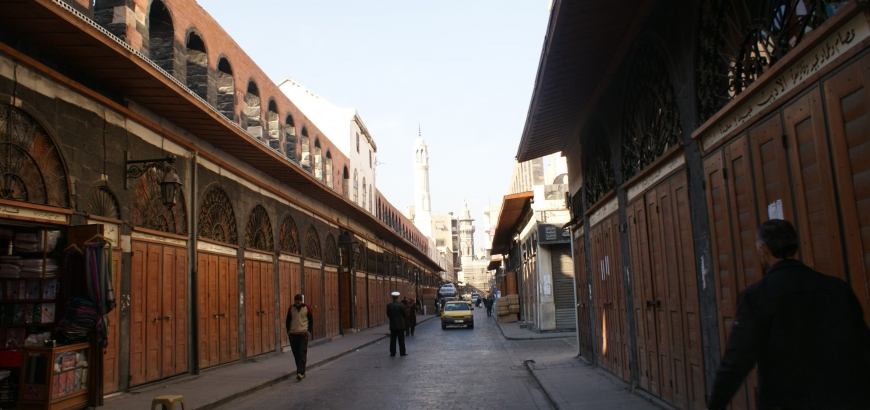The people of the capital of Damascus, especially those that own property in the historical districts of Old Damascus, have experienced fires which devour their heritage buildings and property, the most recent of which occurred last week when the flames consumed a large shop for selling pastries near the Umayyad Mosque.
An employee in the shop told Alsouria Net that recently members of the Abou al-Fadl al-Abbas militia — composed of Lebanese and Iraqi soldiers — had been visiting the owner of the restaurant and taking a number of meals to Shiite pilgrims at the Sayyidah Ruqayya shrine, near the Umayyad Mosque.
Meanwhile Iran is trying to form a zone of special influence in the districts of Old Damascus because of the presence of shrines which it considers sacred for the Shiites. A lawyer was sent to the pastry shop owner, representing Abdullah Nitham, a Shiite religious figure who is influential in Damascus, demanding that he sell the restaurant at the desired price.
The employee said the lawyer’s demand was rejected by the restaurant’s owner, and then after that the “harassment increased toward the restaurant’s owner and the employees there. Supply and health patrols came by to impose fines and taxes before the restaurant was burned down last week.”
As the regime buried the disaster that befell the Al-Asrouniyeh marketplace when fire engulfed dozens of shops in April, official agencies attributed the fire in the restaurant to a “short-circuit.”
It should be noted that the short circuit which the regime spoke about came at a time when most areas of the capital were enduring power outages that last about 16 hours a day.
The Iranian Project
According to locals who spoke to Alsouria Net on the condition of anonymity, the latest fire came as a continuation of Iran’s efforts to take over more Damascus property and taking revenge on those who refuse by reducing the property to ash.
Iran is trying to increase its military and economic presence in the area of the Umayyad Mosque in the square which it is trying to purchase after taking control of it militarily, within an area extending from the Damascus citadel to Bab Touma square and from the arch of Bab Sharqi to the Al-Amin district.
The Damascus residents who spoke to Alsouria Net have begun to feel that they are second-class citizens, pointing out as evidence that which occurred in some districts of the capital during the recent Ashoura ceremonies after Shiite pilgrims travelled from Lebanon and Iraq, welcomed by the regime.
For example, the Ajnah al-Sham company, owned by Rami Makhlouf, transported pilgrims from Najaf in Iraq to Damascus, at a cost that was practically symbolic, while the fighters who came to commemorate Ashoura in Damascus were provided with travel costs by Makhlouf for free.
The regime was also generous toward the Lebanese Shiites who came to Damascus over land, as they were not subjected to searches at the military checkpoints which extend along the capital’s streets, as the residents of the capital were.
Meanwhile the Zein al-Abidin district near the Muhajireen district in Damascus was overwhelmed with black during Ashoura, in mourning for the death of Hussein, and residents in Damascus say that what happened over the last few days reveals more about the sectarian veil in which Iran and the regime want to dress Damascus.
This article was translated and edited by The Syrian Observer. Responsibility for the information and views set out in this article lies entirely with the author.


